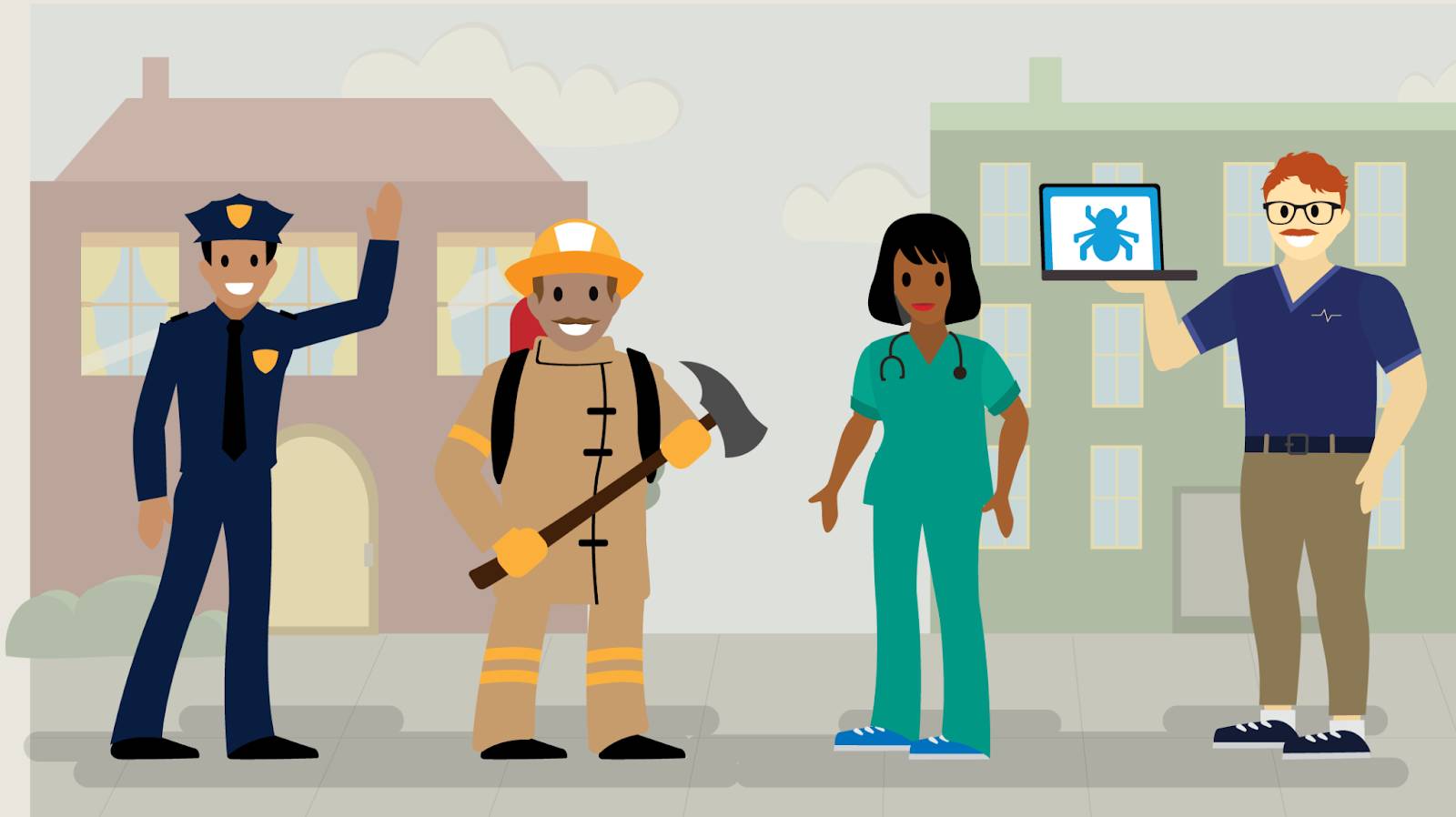Discover the Skills of an Incident Responder
Learning Objectives
After completing this unit, you’ll be able to:
- Describe an incident responder career path.
- List key skills relevant to the role of an incident responder.
An Incident Responder Career
Let’s explore whether you’d be a good fit for the role of an incident responder by starting with some questions.
Who are you?
Do you like to multitask? Do you have the ability to maintain a calm demeanor under stress? Are you an excellent communicator? If so, then incident response might be the career for you.
What do you like to do?
Let’s delve deeper into what incident responders spend their time doing. Incident responders are basically first responders who render aid in response to any IT security threats, incidents, or cyberattacks at their organization. They help organizations alert, triage, and handle incident identification, remediation/mitigation, and intelligence gathering. They are adept at solving security problems and working in fast-paced environments.

Incident responders are involved in planning for incident response at their organization, discovering information about possible incidents on their organization’s systems, mitigating incidents, and reporting on the results of incident response. They also help the organization think through how to reduce the risk of incidents in the future.
Incident responders analyze security incidents and events at their organization to determine their root cause. They are knowledgeable about the lifecycle of cybersecurity threats, attacks, attack vectors, and methods of exploitation, with an understanding of intruder tactics, techniques, and procedures (TTPs). They write policies, procedures, and incident reports. Their job is crucial to helping their organization identify, protect, detect, respond, and recover from incidents.
What type of environment do you want to work in?
The role of incident responder can be an in-house position or a consultant hired for specific times or tasks. You can work for many industries, including government, nonprofits, and banking. As an incident responder, you should enjoy teamwork. You will never be fully trained in every area or avenue involving incident response, so you will often need a team of experts, because no one person could or should be involved in every response effort alone.
What is the career trajectory for this role?
Incident responders may start out in careers as a system, network, or security administrator to build out their skills and knowledge. Recently, many colleges and universities began offering degree programs focused on information security, making it more likely that entry-level incident responders could have access to these roles earlier in their careers. As they mature into their career, they can become directors or managers of incident response teams (IRTs) as well as transition over to penetration tester roles.
Why should you consider this career?
The role of an incident responder can be incredibly lucrative, and it is expected to continue to be in demand. In fact, the cybersecurity field as a whole is growing and needs more skilled professionals. The job is intellectually challenging, and it can open doors to more senior cybersecurity positions.
Incident Responder Skills
After hearing more about this career, you’re excited about helping organizations respond to and recover from incidents. Let’s turn our focus to the education and skills needed to pursue a career as an incident responder.
Education
A bachelor’s degree in computer science, information security, cybersecurity, or a related field is usually good to have, but not necessarily required.
Experience
Typically, employers look for candidates with anywhere from one to three years of experience testing enterprise networks using standard incident response tools such as Splunk, Tanium, or Rapid7. Experience in assessing cybersecurity programs, responding to cyber incidents, analyzing network traffic, and detecting threats are all valuable.
Certifications
To help you skill up and get your foot in the door, pursuing a certification is a great idea. Here are some common certifications for incident responders.
| Certification | Description |
|---|---|
|
Global Information Assurance Certification (GIAC) Certified Incident Handler (GCIH) |
Validates your ability to detect, respond, and resolve computer security incidents using a wide range of essential security skills. GCIH certification holders have the knowledge needed to manage security incidents by understanding common attack techniques, vectors, and tools—as well as defend against and respond to such attacks when they occur. |
|
Teaches you the latest commercial-grade hacking tools, techniques, and methodologies used by hackers and information security professionals to lawfully hack an organization. |
|
|
Teaches you to effectively design, implement, and manage a best-in-class cybersecurity program. |
|
|
Covers the advanced technical skills and knowledge you need to implement, monitor, and administer IT infrastructure using security best practices, policies, and procedures. |
Knowledge
As an incident responder, having a solid understanding of forensic software, ediscovery tools, and system monitoring tools is key. You should know the basics, such as backup techniques, cloud computing responsibility models, and network communication based on Internet Protocol (IP) and Transmission Control Protocol (TCP). It’s also good to have familiarity with UNIX, Windows, and Linux operating systems. A grasp on programming languages is also a plus.
Business Skills
In addition to these technical skills, it’s critical to sharpen your business skills. A huge part of being successful as an incident responder is having problem-solving and analytical skills. You should enjoy communicating with others, have an understanding of business processes supporting the environment you are charged with protecting, and be skilled at customer service and management.
Sum It Up
In this module, you’ve been introduced to the goals of incident response. You’ve learned more about the importance of incident response in helping organizations observe events and incidents, track evidence, contain damage, and mitigate future recurrences. You’ve also discovered the duties, skills, and qualifications of an incident responder.
In the next module, Incident Responder Responsibilities, you learn how to prepare for incident response, identify and contain an incident, remediate and recover from an incident, and report out on the incident response. Interested in learning more about cybersecurity roles and hearing from security professionals? Check out the Cybersecurity Learning Hub on Trailhead.